In this edition of the court judgements review, we look into the Supreme Court’s judgements on the allotment of shares to directors, Madras High Court’s judgements on the wife’s contribution as a homemaker, and also regarding the membership in the bar association, Himachal Pradesh’s High Court judgement on Maternity leave, Karnataka High Court’s judgement on consummation of marriage and Meghalaya High Court’s judgement on POCSO case.
Supreme Court: Disproportionate allotment of shares in favour of one party cannot be set aside merely because the party is the promoters and they benefitted from the allotment of shares.
The Supreme Court, in Hasmukhlal Madhavlal Patel and Anr. vs. Ambika Food Products Pvt Ltd. and Ors held that merely because the allotment of shares benefitted the promoters, the allotment cannot be set aside. The allotment of shares cannot be said to be ‘oppressive’.
The two-judge bench comprising Justice KM Joseph and Justice BV Nagarathna was hearing an appeal filed by H.M Patel Group against the order passed by the National Company Law Tribunal (NCLT) and appellate tribunal (NCLAT) which held the allotment of shares as ‘defective’.
The brief facts of the case are as follows: Ambika Food Products Pvt Ltd is a closely held private limited company that is controlled by three groups of shareholders: the H.M. Patel Group, the Sheth Group, and the V.P. Patel Group, who hold 30.80, 45, and 24.20 per cent of the company’s paid-up share capital, respectively.
Following the advice of the Bank of Baroda, the company’s allowed capital was increased from Rs. 1 crore to Rs. 2 crore. The H.M. Patel Group’s stake rose to 63.58% of the paid-up share capital following the issuance of new shares. The V.P. Patel Group and the Sheth Group each held a stake of 12.74% and 23.68% of the paid-up share capital, respectively. Following this, the other shareholders filed a petition with the National Company Law Tribunal (NCLT) under Sections 397 and 398 of the Companies Act, 1956, alleging mismanagement and oppression on the part of the H.M. Patel Group. The NCLT upheld the company’s increase in authorised share capital, however, finding the distribution of shares as ’defective’. The NCLAT also upheld the same.
Upon hearing both sides and looking at the material facts of the case, the apex court held that the shareholders had the knowledge of the proposal to raise the authorised share capital, and each shareholder was given the opportunity to apply for the additional shares in more or lesser number than they were actually entitled to. Hence, the allegation of mismanagement by the H.M. Patel group is not valid and hence liable to be rejected.
Regarding the oppression in the allotment of additional shares to the directors, thereby benefitting them, the apex court referred to Section 81(3) of the Companies Act, 1956. The court relied on the judgement in Dale & Carrington Invt. P. Ltd and another vs. P.K. Prathapan & others, where in it was held that there is a finer scale to test the directors of a private limited company to eliminate the possibility of misuse of power for personal gain.
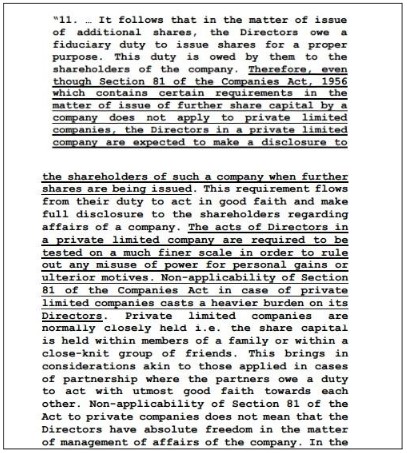
Just because the directors benefitted from the allotment of shares, it must not be construed that the allotment of shares is oppressive.
On the perusal of the minutes of Board meetings, the court held that the terms for allotment of shares were applied equally to all the shareholders. It is just the case that the other shareholders did not apply for the additional shares. NCLAT reasoned that only after the other shareholders refused to accept the shares, the excessive share allotment can take place. The apex court did not agree with this reasoning.
Accordingly, the appeals are allowed and the NCLT and NCLAT orders are set aside.
Madras HC: Wife directly/indirectly contributes to the acquisition of assets, entitled to equal share in the assets/properties.
In a landmark judgement, the Madras High Court, in Kannaian Naidu and others vs. Kamsala Ammal and others, held that if the acquisition of assets/properties is made by the joint contribution of both spouses, either directly or indirectly, then both are entitled to an equal share in the assets. This is a significant judgement that recognizes the wife’s contribution as a homemaker in the acquisition of assets for the family.
A single judge bench of the Madras High Court, headed by Justice Krishnan Ramaswamy, was hearing an appeal filed by the legal heirs of the husband against the judgement of the appellate court that reversed the husband’s argument of usurping the property by the wife. The brief facts of the case are as follows.
The couple in question had been married since 1965, and the court was handling their dispute. In 2002, the husband of Kannaian Naidu filed an injunction suit, alleging that his wife had been attempting to usurp the properties that had been bought on his behalf with the money he earned while he was working abroad. On the other hand, the wife submitted that she also contributed in some form to the acquisition of assets by the family. The husband’s lawsuit was dismissed by the trial court, but the first appellate court reversed the ruling in some cases. In their capacity as his legitimate heirs, Kannanian Naidu’s children filed a second appeal with the High Court following his death.
Upon hearing both sides, the High Court agreed with the wife’s submission regarding the contribution to the acquisition of assets. Even though there is no financial contribution, the wife played an important role in running the family without causing any inconvenience to the husband. The court further held that the wife performs multi-tasks, and it is certainly not a valueless job. Their contribution must be accounted for in deciding the rightful share in the properties acquired.
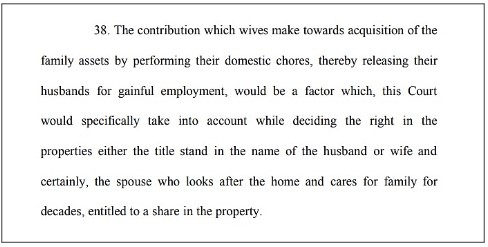
The court also points out the absence of legislation so far that recognizes the direct or indirect contributions made by the wife. Yet, no law prevents judges from recognizing the contributions made by the wife.
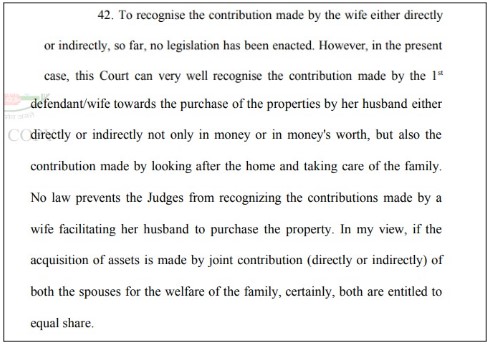
Accordingly, the appeals are partly allowed, and the decree of the first appellate court is modified partially.
Himachal Pradesh HC: Maternity leave is a fundamental right; its denial is violative of Articles 29 and 39D of the Indian Constitution.
In State of HP vs. Sita Devi, the Himachal Pradesh High Court held that maternity leave is intended to achieve social justice for women, motherhood, and childhood, both require special attention, and maternity leave is a fundamental right of every woman, irrespective of her employment status, and its denial is a violation of Articles 29 and 39D of the Indian Constitution. Article 29 related to the Protection of the interests of minorities and Article 39 relates to the certain principles of policy to be followed by the state.
The two-judge bench of the Himachal Pradesh High Court, comprised of Justice Tarlok Singh Chauhan and Justice Virender Singh, was hearing an appeal filed by the state against the order of the Himachal Pradesh Administrative Tribunal that granted the maternity leave benefit to the respondent.
The State argued that the respondent was a daily wage worker, and the respondent could only put in 156 days as against the minimum requirement of 240 days in a year during the year in which her maternity happened. The Tribunal ordered that the period of maternity leave should also be considered as a continuous service.
The High Court looked into the arguments of both parties. The court reminded that India is a signatory to the various international covenants and treaties including the Universal Declaration on Human Rights,1948. India also ratified the “Convention on the Elimination of all Forms of Discrimination against Women” (CEDAW) and “ILO: Maternity Protection Convention 2000.”
The High Court relied on the judgement of the apex court in Municipal Corporation of Delhi vs. Female Workers (Muster Roll) & Anr, wherein the apex court questioned the lack of justification for the denial of maternity benefits to daily wage/casual workers.
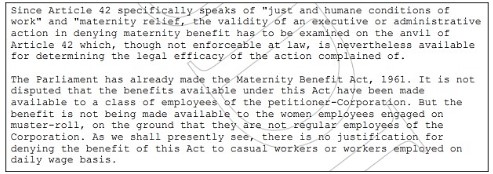
The apex court further held that a just social order can be achieved only when inequalities are obliterated, and everyone is provided with what is legally entitled. It held that becoming a mother is the most natural phenomenon in the life of a woman and employers need to be considerate and sympathetic to them for performing duties while carrying the child in their womb.
Further, in State of H.P vs. Sudesh Kumari, the division bench of the Himachal Pradesh High Court held that the claim of maternity benefit is grounded on social justice and fair play. No discrimination is permitted, and any such discrimination is violative of Articles 14 and 15 of the Indian Constitution.
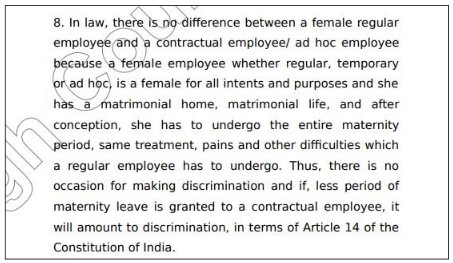
Further, the court held that maternity leave is a fundamental human right of the respondent, which could not have been denied by the employer. The action of the petitioner is violative of Articles 29 and 39D of the Constitution of India. Accordingly, the petition is dismissed.
Karnataka HC: Non-consummation of marriage does not constitute cruelty under section 498A of Indian Penal Code.
In ABC & others vs. State of Karnataka & Anr., the Karnataka High Court held that non-consummation of marriage does not fall under ‘cruelty’ as defined in section 498A of the Indian Penal Code.
The single-judge bench of Justice Naga Prasanna was hearing a petition questioning the proceedings against them under section 498A of the IPC. The brief facts of the case are as follows. The petitioners submitted that the parties married in December 2019 and that their marriage quickly turned sour. The complainant-wife filed two lawsuits: one under Section 498A of the IPC, which started the criminal justice process, and another under Section 12(1)(a) of the Hindu Marriage Act of 1955, which sought to dissolve the marriage on the basis of cruelty.
The counsel for the petitioners argued that the complainant/wife stayed at the matrimonial house only for 28 days and on the ground that the marriage had not been consummated, registered a crime for offence under Section 498A of the IPC. The learned counsel for complainants argued that the husband was a devotee of the Brahma Kumari Samaja sisters and that as a result, whenever she tried to get close to him, he would always say that he was not interested in a sexual relationship. It is also contended that the parents deliberately got their son married to her.
The trial court annulled the marriage on the grounds of cruelty due to the non-consummation of marriage. However, the proceedings of cruelty under section 498A of IPC against the in-laws are pending in the court.
The court upon hearing both sides, looked at section 498A of the IPC.
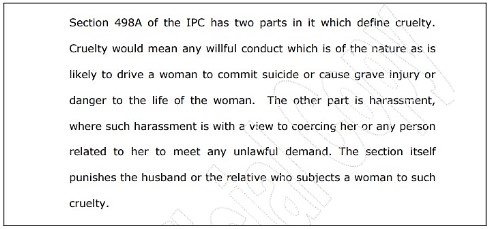
On the perusal of the complaint, the court held that there is no indication of the ingredient of cruelty in the complaint by the wife. Further, if proceedings are permitted to continue against the parents, it would become an abuse of the process of law and become an abuse of the process of law and ultimately result in the miscarriage of justice.
The High Court relied on the judgements in Kahkashan Kausar vs. State of Bihar and Shafiya Khan vs. State of Uttar Pradesh & Another, wherein it was held that,
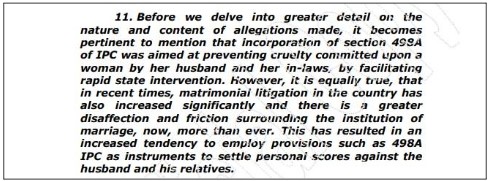
Accordingly, the petition is allowed and proceedings against the in-laws are quashed.
Meghalaya HC: A 16-year-old is capable of making conscious decision as regard his or her well-being as to the actual act of sexual intercourse; quashes POCSO case against him.
In John Franklin Shylla vs. State of Meghalaya & Anr, the Meghalaya High Court held that looking into the physical and mental development of an adolescent of that age group (16 years) would consider it logical that such a person is capable of making conscious decisions as regard his or her well-being as to the actual act of sexual intercourse.
The Single judge bench of Justice W. Diengdoh was hearing a petition filed by the accused seeking the quashing of FIR proceedings under the POCSO Act. The brief facts of the case are as follows.
At the time in question, the petitioner was employed by a number of homes, including the residence of the respondent’s maternal aunt. During this time, he got to know the respondent’s daughter, the alleged victim, who is a little girl. As the two got to know one another, they started to get close, and as a result, a relationship developed in this connection. The petitioner and the victim engaged in sexual activity while sharing the same bed during the duration of the incident. The following morning, the mother of the minor girl filed a First Information Report (FIR) against the petitioner under Section 363 of the Indian Penal Code (IPC) and Sections 3 and 4 of the POCSO Act 2012.
The only ground raised by the counsel for the petitioner it was consensual and there is no element of sexual assault involved. This was even conceded by the counsel for the respondent. The court relied on the judgement of Madras High Court in Vijayalakshmi & Anr. vs. State Rep. By. Inspector of Police, All Women Police Station, wherein it was held that the scheme of the Act clearly shows that it did not intend to bring within its scope or ambit, cases of the nature where adolescents or teenagers involved in romantic relationships are concerned.
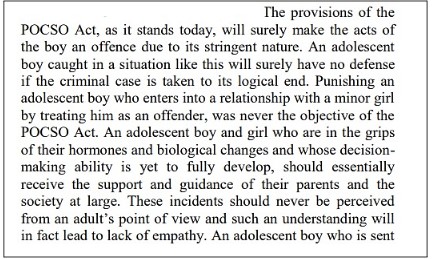
Further, the court held that looking into the physical and mental development of an adolescent of that age group would consider it logical that such a person is capable of making a conscious decision as regard his or her well-being as to the actual act of sexual intercourse. Prima facie, it appears that there is no mens rea involved.
Accordingly, the proceedings in the POCSO Act are set aside and quashed.
Madras HC: There is no rationale in preventing membership to a practicing Lawyer in the Court premises, unless he is disqualified otherwise; direct bar association to give membership without any discrimination.
The Madras High Court reprimanded the Madras Bar Association for discriminating lawyers in becoming a member of the Association. The court held that creating a class within the class of Lawyers cannot be construed as intelligible differentia. It further held that it is improper discrimination by conferring particular privileges upon a class of Lawyers which is arbitrary and not falling within the classification of reasonable distinction.
In Elephant G Rajendran vs. The Registrar General and others, the single judge bench of Madras High Court headed by Justice S.M. Subramaniam was hearing a petition filed by Senior Advocate Elephant Rajendran who claimed that his son Neil Rashan was prevented from getting water at the MBA hall by another senior advocate. Rajendran argued that since the Association was supported by public money, other lawyers in active practise could not be refused access to the facilities. He argued that the Association’s actions were biased and prevented lawyers from using public facilities.
Rajendran also argued that while admitting new members, the association did not follow an open and democratic standard or policy. Additionally, he drew to the court’s attention numerous incidents of discrimination in which the association had denied various applicants for membership in an unfair and arbitrary manner.
The court heard claims and arguments from both sides. The court relied on the judgement of the apex court in S. Seshachalam vs. Bar Council of Tamil Nadu, wherein it was held that every differentiation is not discrimination but at the same time, differentiation must be founded on pertinent and real differences as distinguished from irrelevant and artificial ones.
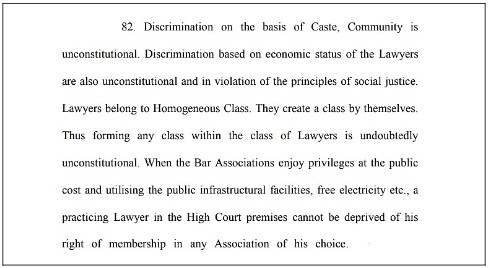
Further, upon bare reading of the conditions to become a member of the bar association, the choice is provided to the existing members. The existing members will have their own choice in selecting the members. Such allocation would undoubtedly cause not only discrimination but lead to the constitution of an Elite Community of Lawyers within the Lawyers community. Such constitution of the Elite Community of Lawyers under no circumstances be allowed at the cost of the public, more so in the public premises.
The court further pointed out the powers of the High Court with regard to bar associations within court premises. The High Court has got ample powers to control the functions and affairs of the Bar Associations within the Court premises.
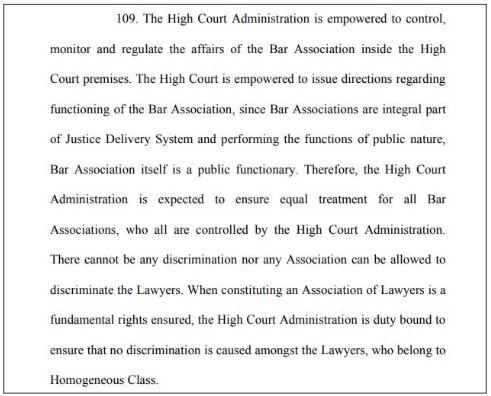
Accordingly, the writ petition is disposed of, and a compensation of Rs. 5 lakhs should be paid to the victim for the untoward incident that happened to them.


